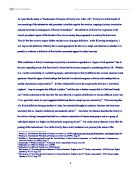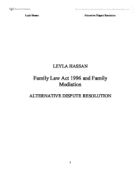A voidable marriage also has to meet certain criteria and this is set out in section 12 of the MCA. The grounds for voidable marriage are clear and include the non consummation due to incapacity ( Petitt v Pettit) by either party or indeed wilful refusal by either party to consummate(Horton v Horton). If either party did not give valid consent due to duress( Hirani v Hirani, H v H, Szechter(otherwise Karsov) v Szechter) or mistake or was suffering from a mental disorder( Bennett v Benett) within the denotation of the Mental Health Act (1983) that would make them unfit for marriage. Voidable issues also included the issue of either party having a venereal disease at the time of marriage and lastly if the respondent was pregnant at the time of marriage with a baby conceived by a person other than the petitioner.
It must be noted however that in a marriage that is void there are no bars to the proceedings but in the case of a voidable marriage under section 13(1) of the MCA all 8 grounds are an absolute defence. Moreover section 13(2) of the MCA as amended by the Matrimonial and Family Proceedings Act (1984) clearly imposes a time restriction of 3 years from time of marriage to petition for the marriage to be voidable.
In the case of Kate her marriage meets the criteria set in both void and voidable marriage. Firstly Kate has wilfully refused to consummate the marriage but she cannot petition this ground herself as she is the person who has refused to consummate. This point is clarified in the case of Horton v Horton. It is clear that Douglas had a prior subsisting marriage as even though he did not believe his wife was alive he didn’t apply for a decree of presumption of death and dissolution of marriage certificate under section 19 of the MCA. The MCA makes clear that if a party to a marriage believes that the spouse is dead then all avenues to locate the missing spouse must be followed and that assumption of death is not enough to satisfy the law. The presumption of death must be satisfied, in that for 7 years there has been no contact with any person by the absent spouse and that all enquiries have been exhausted and also that any person who has reason to believe that a missing spouse is dead must apply to the court to have the marriage dissolved. The leading case that can define this point is Chard v Chard. In the case of Chard the court found that although no-one had any contact with the missing spouse for 16 years it did not amount to presumption of death and the court did in fact refuse to presume the missing spouse was indeed dead. This would in fact void any second marriage as it would not be a legal marriage under England and Wales’s law. However this point can also be used in any subsequent case arising as a result of bigamy as a defence.
It is clear by the conduct of Douglas that this point of law would deem his marriage to Kate unlawful and void the marriage. Therefore if Kate wishes she can apply to the court for a nullity on this ground. However Kate does not need to do this in law as the marriage is unrecognised as previously stated but the option of applying to the court for a decree of nullity would assist in any financial matters directly related to her and Douglas.
In the case of Monica, she can apply to the court for nullity as her marriage is clearly voidable due to duress as her parents threatened her liberty with the threats of going into a mental institution if she refused to marry Darryl as defined in the aforementioned case law. In the UK forced marriage is treated seriously with the government establishing a dedicated specialist unit namely, The Forced Marriages Unit and also published a consultation paper on the same issue to discuss if the forced marriage of any individual should then be a criminal offence for any party playing a part in putting an individual under duress or threat if they refuse to co operate and go forward into a marriage they clearly do not wish to enter.This is a clear indication that the government are indeed taking this matter seriously and therefore Monica should have an easy path in her quest for a decree of nullity.
Matrimonial Causes Act (1973)
Bessant, Transsexuals and marriage after Goodwin v United Kingdom [2003] Family Law 111
[1971] P 286, [1970] 3 AII ER 905
Matrimonial and Family Proceedings Act (1984)
The Comprehensive Guide to All the Facts Family Law p.4
Matrimonial Causes Act(1973) section 12(b)
Matrimonial Causes Act (1973) section 19
Forced Marriage: A Wrong Not a Right: September 2005







